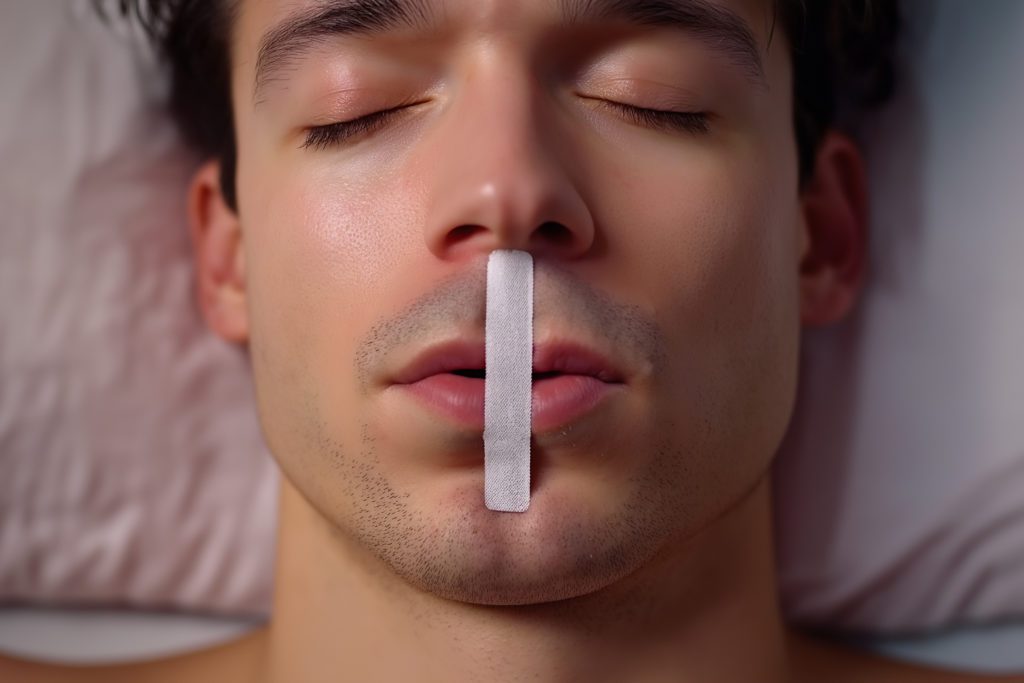
Can Sleep Apnea Cause High Blood Pressure?
Uncover the critical link between sleep apnea and hypertension and what you can do about it.

Sleep apnea’s hidden role in hypertension
You might think the worst part of sleep apnea is the loud snoring that echoes through the night, but there’s a stealthier issue at play. Each interruption in breathing that sleep apnea sufferers experience could be quietly cranking up their blood pressure, often without them even realizing it.
This article digs into how these nightly disruptions can lead to long-term cardiovascular issues, and what you can do to protect your health. Let’s look at the science behind sleep apnea and high blood pressure, and uncover effective strategies to manage both.
What is sleep apnea?
Sleep apnea is a serious sleep disorder where breathing repeatedly stops and starts throughout the night. It’s when your body literally pauses its breathing efforts, which can happen hundreds of times a night. There are two main types:
Obstructive Sleep Apnea (OSA): The more common form, where the airway is physically blocked, often by the collapse of soft tissue at the back of the throat.
Central Sleep Apnea: Less common and more concerning, this type occurs when the brain fails to send the proper signals to muscles that control breathing.
Symptoms include excessive daytime sleepiness, loud snoring, abrupt awakenings accompanied by gasping or choking, and a sore throat upon waking. These interruptions not only shatter sleep quality but also trigger a cascade of health issues, notably high blood pressure, as the body struggles with reduced oxygen levels and fragmented sleep.
Can sleep apnea cause high blood pressure?
Worryingly, yes. Sleep apnea can seriously ramp up your blood pressure. The connection lies in how the disorder disrupts your body's normal rhythms and functions. Every time sleep apnea halts your breathing, your oxygen levels drop. This puts your body into a state of stress, which is similar to a red alert situation where various systems, including cardiovascular, spring into emergency mode.
This drop in oxygen—known as hypoxia—signals your body to release adrenaline, a stress hormone, which in turn raises your heart rate and, consequently, your blood pressure. Plus, these frequent nightly interruptions prevent you from reaching and sustaining deep, restorative stages of sleep, which are crucial for cardiovascular health. Instead of dipping at night as it normally would, your blood pressure stays elevated, a condition known as non-dipping, which is associated with higher cardiovascular risks.
The chronic cycle of disrupted sleep and low oxygen not only maintains high blood pressure but can also make it progressively worse, laying the groundwork for hypertension. This is why treating sleep apnea is often key to managing blood pressure effectively.
Let’s look at some of the evidence…
Research has consistently linked sleep apnea with higher blood pressure, painting a clearer picture of how disrupted sleep affects heart health. A study in the Journal of the American Medical Association reveals that individuals with moderate to severe obstructive sleep apnea are more likely to develop hypertension. This link holds true even when accounting for other risk factors like age, weight, and smoking habits.
The impact of sleep apnea on blood pressure was further detailed in a study in the Journal of Clinical Sleep Medicine. It showed that people with sleep apnea often miss out on the normal nighttime dip in blood pressure, the phenomenon we outlined above known as "non-dipping." This non-dipping status is concerning because it's associated with a higher risk of cardiovascular diseases.
Additionally, a comprehensive review in the American Journal of Respiratory and Critical Care Medicine highlights several studies where treating sleep apnea with CPAP therapy not only improved sleep quality but also reduced blood pressure levels, especially in those with treatment-resistant hypertension.
These studies make it clear: the broken sleep patterns caused by sleep apnea can lead to serious cardiovascular issues by keeping blood pressure elevated throughout the night. Addressing sleep apnea can thus be a crucial step in controlling blood pressure and improving overall heart health.
Mitigating the risks with CPAP and other treatments
CPAP machines are front-line defenders in managing sleep apnea and its ripple effects, like high blood pressure. By keeping airways open at night, CPAP prevents those problematic sleep interruptions and the subsequent oxygen dips. As we explored in the evidence above, regular use has been shown to significantly lower blood pressure, particularly in those with stubborn, resistant hypertension.
In addition to CPAP, options might include medications such as ACE inhibitors to control blood pressure, or lifestyle modifications to enhance overall effectiveness. For some, surgery might be a viable option to clear airway obstructions, offering a longer-term solution to sleep apnea and its associated risks.
Lifestyle adjustments and preventative measures
Tackling sleep apnea and high blood pressure might seem daunting, but integrating a few lifestyle tweaks can make a big difference:
- Eat a heart-healthy diet. Think lots of fruits, veggies, and whole grains, and less salt and saturated fat.
- Get moving. Regular exercise helps lower blood pressure, improve heart health, and reduce sleep apnea symptoms.
- Stick to a sleep schedule with the help of a sleep tracking app, and make sure to dodge late-night stimulants like caffeine.
- Limit alcohol and quit smoking. Both can worsen sleep apnea and spike your blood pressure.
- Stay on top of check-ups. Keeping in touch with your doctor to monitor and tweak your treatment plan is important for staying ahead of both conditions.
Small steps can lead to big improvements in managing both sleep apnea and high blood pressure, improving your health and daily life. Give some of these a try and track your results!
Take charge of your health, starting with your sleep
We've explored how sleep apnea can spike blood pressure and the role of CPAP and lifestyle adjustments in turning the tide. Don’t let sleep apnea dictate your health—seek advice, explore treatments that work for you, and commit to lifestyle adjustments that bolster well-being. Take the reins on your health and enjoy the profound benefits that come with better sleep and controlled blood pressure.
FAQ
Does sleep position affect sleep apnea and blood pressure levels?
Yes, sleeping on your back can worsen sleep apnea by causing airway obstruction, leading to decreased oxygen levels and increased blood pressure. Sleeping on your side can help keep the airway open and reduce apnea episodes. Special pillows and positional therapy can aid in maintaining a better sleep posture.
Are there early warning signs that sleep apnea may be affecting blood pressure?
Signs include frequent nighttime awakenings, morning headaches, daytime fatigue, and difficulty concentrating. These symptoms suggest that oxygen deprivation is straining the cardiovascular system, potentially leading to elevated blood pressure levels. Early detection and treatment are crucial to prevent complications.
Can sleep apnea worsen existing heart conditions beyond high blood pressure?
Yes, untreated sleep apnea increases the risk of heart arrhythmias, heart failure, and stroke. The repeated stress caused by oxygen deprivation and blood pressure surges puts significant strain on the heart, worsening pre-existing cardiovascular conditions and potentially leading to life-threatening complications.
Is there a connection between sleep apnea, high blood pressure, and diabetes?
Yes, sleep apnea is linked to insulin resistance, contributing to the development of type 2 diabetes. The combination of sleep apnea, high blood pressure, and diabetes—known as metabolic syndrome—poses serious health risks, increasing the likelihood of heart disease, kidney problems, and stroke.
Does alcohol consumption worsen sleep apnea and its impact on blood pressure?
Can weight loss alone cure sleep apnea and reduce high blood pressure?
Weight loss can significantly improve or even resolve mild to moderate sleep apnea by reducing fat deposits around the airway. It can also help lower blood pressure naturally. However, severe sleep apnea cases may still require CPAP or other treatments even after weight reduction.
Are there genetic factors that increase the risk of sleep apnea and high blood pressure?
Yes, genetics can influence factors like airway structure, body weight, and sleep patterns, all of which contribute to sleep apnea and hypertension risk. A family history of these conditions increases the likelihood of developing them, making early screening and lifestyle changes crucial.
What diagnostic tests can confirm if sleep apnea is causing high blood pressure?
A sleep study (polysomnography) is the gold standard for diagnosing sleep apnea by monitoring breathing, oxygen levels, and sleep stages. Some advanced sleep tracking devices can also help identify patterns, such as frequent awakenings and irregular breathing, that may indicate sleep apnea, prompting further medical evaluation.

Written by
Georgia Austin
Professionally trained copywriter, editor, and content marketing strategist with over 7 years of experience—working with brands like Nike, Siemens, Toshiba, Tommy Hilfiger, Culture Trip, and Klook.
Download Pillow
Get help
Press & News
Legal
Connect
X (Twitter)
Company
Copyright © Neybox Digital Ltd.



